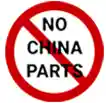Hydraulic systems play a fundamental role in aviation by powering and adjusting essential mechanisms like landing gear, brakes, flaps, and flight control surfaces. These systems typically employ specially formulated fluids that are capable of withstanding the demanding thermal and pressure conditions commonly encountered during high-altitude flights. This blog will examine various types of hydraulic fluids used in aircraft, outlining their defining properties, respective advantages, and common areas of use.
Hydraulic fluids are specially formulated liquids that are engineered to transmit power throughout an aircraft's pressurized systems, enabling the smooth and controlled operation of various mechanical components. These fluids are often chosen and optimized to meet strict requirements for viscosity, thermal stability, and material compatibility to ensure consistent performance across diverse aerospace environments.
Mineral-based hydraulic fluids represent one of the earliest types used in aviation, which is why they remain common in many older aircraft models. They tend to offer effective lubricating properties and are generally compatible with a wide range of seal materials, though they may exhibit limitations in maintaining stability under extreme temperatures.
Phosphate ester-based fluids are non-petroleum, fire-resistant options frequently utilized in a wide variety of commercial airliners and military aircraft. These fluids generally offer greater fire resistance than mineral-based alternatives, but their chemical reactivity and potential to degrade certain seal materials require careful selection of compatible components to minimize the risk of leakage.
Synthetic hydrocarbons are often selected as modern fluid solutions for systems operating in low-temperature environments, as they are designed to maintain reliable performance across wide temperature ranges. While their fire resistance generally falls short of that provided by phosphate esters, their long service life makes them ideal choices for various military and business aviation platforms.
When selecting a suitable hydraulic fluid for a given application, it is often beneficial to evaluate the following performance factors:
To ensure consistent system performance, operators should account for the following key maintenance factors:
Owned and operated by ASAP Semiconductor, Civil Aircraft Supplies is a trusted platform for customers who are seeking access to an expansive selection of hydraulic fluids suitable for landing gear systems, flight control surfaces, and much more. With our procurement power, market expertise, and robust supplier relationships, you can have your most challenging requirements met without having to forgo quality, timely fulfillment, or competitive pricing. Knowing how we intend to surpass customer expectations with our range of offerings and services, be sure to take the initial step of procurement today.
Posted on April 20, 2025 susan white



“We Proudly Support Intrepid Fallen Heroes Fund that serves United States Military Personal experiencing the Invisible Wounds of War : Traumatic Brain Injury (TBI) and Post Traumatic Stress (PTS). Please visit website (www.fallenheroesfund.org) and help in their valiant effort”.
We Hope that You Will Visit Us Again the Next Time You Need Aircraft Parts and Make Us Your Strategic Purchasing Partner.
Request for Quote